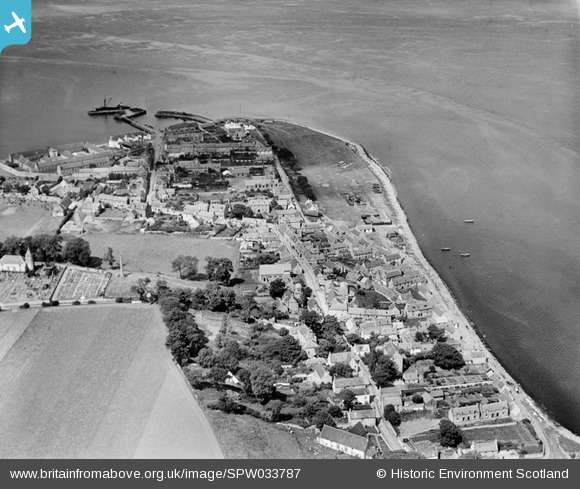SPW033787 SCOTLAND (1930). Cromarty, general view, showing Church Street and Cromarty Harbour. An oblique aerial photograph taken facing north.
© Copyright OpenStreetMap contributors and licensed by the OpenStreetMap Foundation. 2025. Cartography is licensed as CC BY-SA.
Details
| Title | [SPW033787] Cromarty, general view, showing Church Street and Cromarty Harbour. An oblique aerial photograph taken facing north. |
| Reference | SPW033787 |
| Date | 1930 |
| Link | Canmore Collection item 1297999 |
| Place name | |
| Parish | CROMARTY |
| District | ROSS AND CROMARTY |
| Country | SCOTLAND |
| Easting / Northing | 278899, 867505 |
| Longitude / Latitude | -4.0311365730363, 57.681318327809 |
| National Grid Reference | NH789675 |
Pins
 EdCC |
Friday 21st of August 2020 06:40:40 PM | |
 ccgd |
Tuesday 11th of December 2012 09:55:57 PM | |
 ccgd |
Tuesday 11th of December 2012 09:54:05 PM | |
 ccgd |
Tuesday 11th of December 2012 09:53:15 PM | |
 ccgd |
Tuesday 11th of December 2012 09:50:47 PM | |
 JMB |
Sunday 7th of October 2012 10:45:18 AM | |
 JMB |
Sunday 7th of October 2012 10:41:40 AM | |
 JMB |
Sunday 7th of October 2012 10:38:17 AM | |
 JMB |
Sunday 7th of October 2012 10:36:56 AM | |
 JMB |
Sunday 7th of October 2012 10:36:11 AM | |
 JMB |
Sunday 7th of October 2012 10:35:03 AM | |
 JMB |
Sunday 7th of October 2012 10:31:40 AM |
User Comment Contributions
'The jewel in the crown of Scottish vernacular architecture', Cromarty is one of the best preserved historic towns in the Highlands and an outstanding example of an 18th /early 19th century Scottish burgh. Its character comes from a rich mixture of small fisherman's cottages, fine Georgian town houses and Victorian commercial buildings, featuring architectural detail such as crow-stepped gables, slate roofs, marriage stones and datestones. Cromarty is home to the thatched fisherman's cottage where the influential self-taught geologist Hugh Miller was born in 1802 (http://canmore.rcahms.gov.uk/en/site/14437/details/cromarty+church+street+hugh+miller+s+cottage/). |
 Brian Wilkinson |
Tuesday 17th of September 2013 01:49:38 PM |


![[SPW033787] Cromarty, general view, showing Church Street and Cromarty Harbour. An oblique aerial photograph taken facing north.](http://britainfromabove.org.uk/sites/all/libraries/aerofilms-images/public/100x100/SPW/033/SPW033787.jpg)
![[SPW033791] Cromarty, general view, showing Braehead and Gaelic Chapel, The Paye. An oblique aerial photograph taken facing east.](http://britainfromabove.org.uk/sites/all/libraries/aerofilms-images/public/100x100/SPW/033/SPW033791.jpg)
![[SPW033790] Cromarty, general view, showing The Links and Gaelic Chapel, The Paye. An oblique aerial photograph taken facing south. This image has been produced from a damaged negative.](http://britainfromabove.org.uk/sites/all/libraries/aerofilms-images/public/100x100/SPW/033/SPW033790.jpg)
![[SPW033789] Cromarty, a general view, showing The Links and Cromarty Harbour. An oblique aerial photograph taken facing west.](http://britainfromabove.org.uk/sites/all/libraries/aerofilms-images/public/100x100/SPW/033/SPW033789.jpg)
